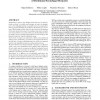Free Online Productivity Tools
i2Speak
i2Symbol
i2OCR
iTex2Img
iWeb2Print
iWeb2Shot
i2Type
iPdf2Split
iPdf2Merge
i2Bopomofo
i2Arabic
i2Style
i2Image
i2PDF
iLatex2Rtf
Sci2ools
109
click to vote
DATE
2007
IEEE
2007
IEEE
Architectural leakage-aware management of partitioned scratchpad memories
Partitioning a memory into multiple blocks that can be independently accessed is a widely used technique to reduce its dynamic power. For embedded systems, its benefits can be even pushed further by properly matching the partition to the memory access patterns. When leakage energy comes into play, however, idle memory blocks must be put into a proper low-leakage sleep state to actually save energy when not accessed. In this case, the matching becomes an instance of power management problem, because moving to and from this sleep state requires additional energy. In this work, we propose an explorative solution to the problem of leakage-aware partitioning of a memory into disjoint sub-blocks. In particular, we target scratchpad memories, which are commonly used in some embedded systems as a replacement of caches. We show that the total energy (dynamic and static) cost function yields a non-convex partitioning space, making smart exploration the only viable option; we propose an effecti...
Related Content
| Added | 02 Jun 2010 |
| Updated | 02 Jun 2010 |
| Type | Conference |
| Year | 2007 |
| Where | DATE |
| Authors | Olga Golubeva, Mirko Loghi, Massimo Poncino, Enrico Macii |
Comments (0)

